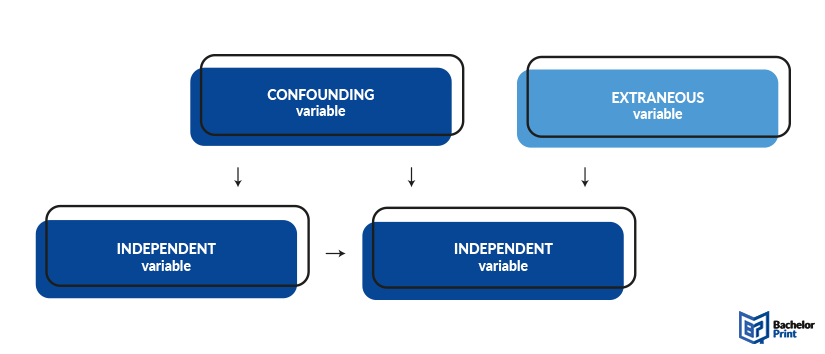
In the methodology of academic research, addressing extraneous variables is crucial to maintain the integrity and validity of your study. Mastering the identification and control of extraneous variables ensures a more accurate and reliable result in your academic work. The following article will deepen your understanding of extraneous variables and their impact on your research findings.
Definition: Extraneous variables
Extraneous variables are those, who can influence the dependent variable without being a subject to the research. This means their influence can manipulate the results of a study and may lead to wrong interpretations of the relationship between the independent and dependent variable. Most types of research bias are introduced because of extraneous variables that have not been controlled.
Extraneous variables vs. confounding variables
Although at first, these two can easily be confused, differentiating extraneous variables from confounding variables is pretty simple. An extraneous variable is an external influence on the dependent variable. A confounding variable, on the other hand, is tied to both the independent variable and the dependent one, often closely related to the former.

Types and examples of extraneous variables
Extraneous variables can also be divided into different categories, depending on what and how they influence the dependent variable or what they consist of. Generally, any research bias is a result of not-considered influences on the test subjects.
Situational variables
Situational variables refer to the environment of your test and its variability. This means that when you change the experimental setting, these variables are also altered, resulting in unwanted changes of research outcomes. In this category belong influences like:
Participant variables
Participant variables focus on the individuality of each participant, the different predispositions and personality traits, but also possible illnesses that were not initially considered. These can include:
Experimenter effect
The experimenter effect, also called experimenter bias, revolves around the researcher. On the one hand, they can subconsciously hint the research question about the participants, resulting in a change of their behavior.
On the other hand, the basic characteristics of the experimenter, such as age, gender, nationality, characteristics, or mood can also have an impact on the behavior of the test subjects.
Methodological variables
Methodological variables are, among other things, the test equipment and strategies of the researchers. Variation in the techniques used to collect data and errors in measurement can greatly alternate the results of any experiment.
Task variables
Task variables concern the nature of the tasks given to the participants, for example difficulty or familiarity. This type of extraneous variable often works hand in hand with other types, especially participant variables, since the way someone solves a problem is highly dependent on their predispositions.
Demand characteristics
Demand characteristics are a type of bias that includes all other forms of extraneous variables. They can hint the objective of the research to the participants, who then feel the need to confirm the expectations. However, that way the study loses validity and representativeness.
in Your Thesis
Controlling factors
As research bias will negatively affect the validity of your research, it is crucial to limit and control extraneous variables as much as possible.
Standardized procedures ensure that every possible influence stays unchanged throughout the entire experimental process.
Counterbalancing is used to minimize the risk of task order influencing the results. Therefore, the sample is split into two or more groups randomly and each group finishes the tasks in different orders. This helps reduce the possibility of one task influencing another without intention.
Random sampling reduces the impact of participant variables as every person has the same probability of being sampled or, when dividing the sample, the same probability of ending up in either group.
Masking is similar to conducting a double-blind study, as it is based on the fact that the person administrating the experiment does not know its goal either. This way, they cannot subconsciously hint the research question or bias the results to their favor.
Other types of variables
- independent variables
- dependent variables
- independent vs. dependent variables
- explanatory vs. response variables
- control variables
- mediator variables
- moderator variables
- mediator vs. moderator
- confounding variables
- extraneous variables
- categorical variables and qualitative variables
- quantitative variables and numerical variables
- nominal variables
- ordinal variables
- discrete variables
- continuous variables
- interval variables and ratio variables
- random variables
- latent variables
- composite variables
- binary variables
FAQs
Extraneous variables are not controlled influencers on the dependent variable, often leading to research bias.
While extraneous variables influence only the dependent variable, confounding variables have a connection to the independent variable as well.
Some examples of extraneous variables include:
- Environmental factors: time of day, spectators, clarity of instructions
- Personal factors: mood, characteristics, medical predispositions
- Experimental factors: characteristics of the researcher, research methodologies, tasks
